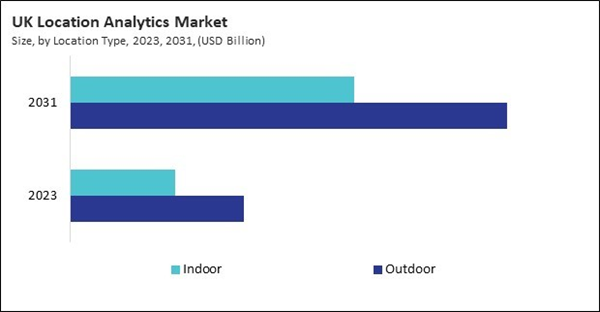The Germany market dominated the Europe Location Analytics Market by country in 2023, and is expected to continue to be a dominant market till 2031; thereby, achieving a market value of $3.45 billion by 2031. The UK market is exhibiting a CAGR of 12.9% during 2024-2031. Additionally, the France market is expected to experience a CAGR of 14.7% during 2024-2031.
The widespread adoption of IoT-enabled devices, GPS tracking systems, and connected sensors has led to a surge in the availability of location data, which businesses are now using to streamline operations. From logistics and retail to urban planning and emergency response, these analytics has become vital for organizations seeking to optimize workflows and improve service delivery.
Governments and municipal authorities also leverage these analytics to build smarter cities by optimizing traffic management, resource allocation, and public safety measures. IoT-driven location intelligence solutions have been deployed in response to the proliferation of smart city initiatives.
The adoption of these analytics in Europe is accelerating, driven by technological advancements, increasing digitization, and strong government support. Across the region, businesses and policymakers recognize the value of geospatial intelligence in improving efficiency, security, and service delivery. With the rise of smart cities, Industry 4.0, and AI-powered decision-making, these analytics has become a critical tool in industries ranging from manufacturing and retail to healthcare and IT infrastructure. European governments actively integrate geospatial data into their economic, digital, and sustainability strategies, fueling regional demand for location intelligence solutions. Germany’s reputation as Europe’s industrial powerhouse is reflected in its increasing reliance on location analytics in manufacturing. As smart factories become the norm under Industry 4.0, manufacturers use real-time geospatial data to track assets, optimize warehouse logistics, and enhance supply chain visibility. The French government’s support for digital innovation through initiatives like La French Tech has encouraged businesses to adopt AI-driven location intelligence to remain competitive in an increasingly data-driven economy. With urban centers like Paris leading the way in smart retail technologies, integrating location analytics enhances e-commerce logistics and in-store experiences. Thus, Europe is poised to remain a global leader in the market.
List of Key Companies Profiled
- IBM Corporation
- SAP SE
- Microsoft Corporation
- Oracle Corporation
- SAS Institute, Inc.
- Google LLC (Alphabet Inc.)
- Hewlett Packard Enterprise Company
- Cisco Systems, Inc.
- Esri, Inc.
- Zebra Technologies Corporation
Market Report Segmentation
By Component
- Solution
- Reporting & Visualization
- Thematic Mapping & Spatial Analysis
- Geocoding & Reverse Geocoding
- Data Integration & ETL
- Other Solution Type
- Services
- Consulting
- Implementation
- Support & Maintenance
By Location Type
- Outdoor
- Indoor
By Deployment
- On-Premises
- Cloud
By Industry Vertical
- Retail
- Healthcare
- Transportation & Logistics
- BFSI
- IT & Telecommunications
- Manufacturing
- Other Industry Vertical
By Application
- Risk Assessment & Mitigation
- Customer Experience Management
- Sales & Marketing Optimization
- Supply Chain Management
- Disaster & Emergency Response Management
- Other Application
By Country
- Germany
- UK
- France
- Russia
- Spain
- Italy
- Rest of Europe
Table of Contents
Companies Mentioned
- IBM Corporation
- SAP SE
- Microsoft Corporation
- Oracle Corporation
- SAS Institute, Inc.
- Google LLC (Alphabet Inc.)
- Hewlett Packard Enterprise Company
- Cisco Systems, Inc.
- Esri, Inc.
- Zebra Technologies Corporation









